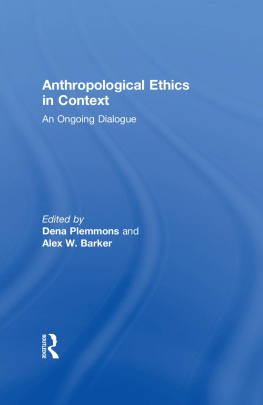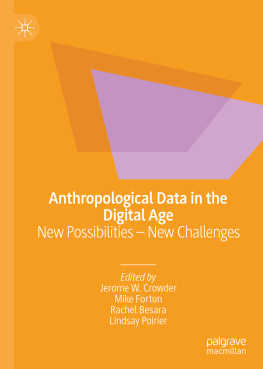Anthropological Ethics in Context
Anthropological Ethics in Context
An Ongoing Dialogue
EDITED BY
Dena Plemmons
and Alex W. Barker
First published 2016 by Left Coast Press, Inc.
Published 2016 by Routledge
2 Park Square, Milton Park, Abingdon, Oxon OX14 4RN
711 Third Avenue, New York, NY 10017, USA
Routledge is an imprint of the Taylor & Francis Group, an informa business
Copyright 2016 Taylor & Francis
All rights reserved. No part of this book may be reprinted or reproduced or utilised in any form or by any electronic, mechanical, or other means, now known or hereafter invented, including photocopying and recording, or in any information storage or retrieval system, without permission in writing from the publishers.
Notice:
Product or corporate names may be trademarks or registered trademarks, and are used only for identification and explanation without intent to infringe.
Library of Congress Cataloging-in-Publication Data
Anthropological ethics in context : an ongoing dialogue / edited by
Dena Plemmons and Alex W. Barker.
pages cm
Includes bibliographical references and index.
ISBN 978-1-61132-879-0 (hardback : alk. paper) -- ISBN 978-1-61132-
880-6 (pbk. : alk. paper) -- ISBN 978-1-61132-881-3 (institutional
ebook) -- ISBN 978-1-61132-882-0 (consumer ebook)
1. Anthropological ethics. 2. Anthropology--Methodology. I.
Plemmons, Dena, editor. II. Barker, Alex W., editor.
GN33.6.A46 2015
174.9301--dc23
2015022152
ISBN 978-1-61132-879-0 hardback
ISBN 978-1-61132-880-6 paperback
Contents
Virginia R. Dominguez
David H. Price
Dena Plemmons and Alex W. Barker
Do No Harm
Katherine C. MacKinnon
David H. Price
Alex W. Barker
Robert Albro and Dena Plemmons
Nathaniel Tashima and Cathleen Crain
Alex W. Barker
Dena Plemmons
Whats Different?
Alex W. Barker and Dena Plemmons
Laura A. McNamara
Monica Heller
The contributions in this volume document the development of the most recent principles of professional ethics of the American Anthropological Association, the worlds largest professional organization of anthropologists from all fields of practice. The AAA comprises forty different professional societies or sections representing different subfields or topics, geographical areas, and anthropological identities, and thereby brings these principles into the work of scholars studying all aspects of the human career. The contributions represent the viewpoints of different participants in the process of developing and debating the current ethical positions of the Association, reflecting their unique and sometimes conflicting personal perspectives on the complex and contentious topics involved.
An introductory chapter by the then-president of the AAA at the time the project began and an afterward by the AAAs current president help place the development of the current ethical statement into a broader institutional context. The book traces the historical development of the Associations ethics codes and the historical events which engendered their development, as well as the immediate social and political context in which the current statement was developed. Separate chapters address each of the individual principles and are written by participants in the discussions leading to their development and adoption. The two final chapters examine how the current statement differs from past statements or codes, and discuss the challenges of developing ethical expectations inclusive of anthropologists practicing in increasingly diverse and dissimilar contexts.
What the book does not represent is a complete and exhaustive discussion of every aspect of every principle. Such an enterprise is beyond both our ability and our inclinationanthropologists of good conscience can and should interpret these principles in different ways based on the unique circumstances of each situation, study, or project. An exhaustive explanation of how each principle should be viewed in all possible circumstances presupposes a static and unchanging document, which is quite different than our common intent in developing these principles.
Nor does the book represent positions in a unified or consistent manner. Each author approached these issues through their own sub-disciplinary lenses and personal experience, and each of the participants perceived the discussion in somewhat different ways. Each chapter therefore reflects the individual opinion of its respective author(s).
Dena Plemmons and Alex W. Barker
Virginia R. Dominguez
As a recent past president of the American Anthropological Associationand the president during whose tenure most of the work of the AAA Task Force for Comprehensive Ethics Review was doneI am especially pleased to help introduce this book and launch it as a reflection and articulation of this deep, difficult, thoughtful, and inspiring project.
Most scientists, as Thomas Kuhn aptly argued in his now classic book The Structure of Scientific Revolutions (1962), work with paradigms, patterns, and habits that he called the workings of normal science. It is what I have recently called our professional comfort zones and their dangers (Dominguez 2012). They are those ideas, practices, discourses, and questions that get to be so much a part of a scientific discipline or profession at any one time that they often get learned and adopted more than reflected upon or questioned.
This book reminds us of how important it is to reflect on our comfort zones, their dangers, and the paradigms, patterns, and habits that become second-nature, at times so much so that they are to the detriment of the practitioner and the people or places s/he studies. I am not saying that thinking about ethics is new to anthropologists. It isnt. I am saying that the ethical questions are so central to the practice of anthropological life and work that they must be spotlighted and not just added to the training of new anthropologists or the awareness of professional anthropologists.
I am also saying that delving into matters of ethics means plunging into the struggle it entails. It is a struggle that is personal and professional, never-ending and open-ended, and crucial but without simple answers. It is that sense of worthwhileness and necessity, struggle and everydayness that is highlighted in this book. The AAA Task Force for Comprehensive Ethics Review had predecessors. The AAA has had principles and statements on ethics, and even resolutions on ethics, at various points in its long history (since the turn of the twentieth century) (see ). What this book does is to highlight what has been learned from the past and what the current struggles are. It offers the background and conveys the urgency of the matter. It offers reflections and descriptions of the process of the AAAs deliberations and its conclusions. It does not provide a simple answer, or even a simple formula, but it does go far toward keeping anthropologists (and their fellow travelers) from staying too much in their comfort zones of their own work and lives (both in their fields of research and in their everyday institutional places of work).











